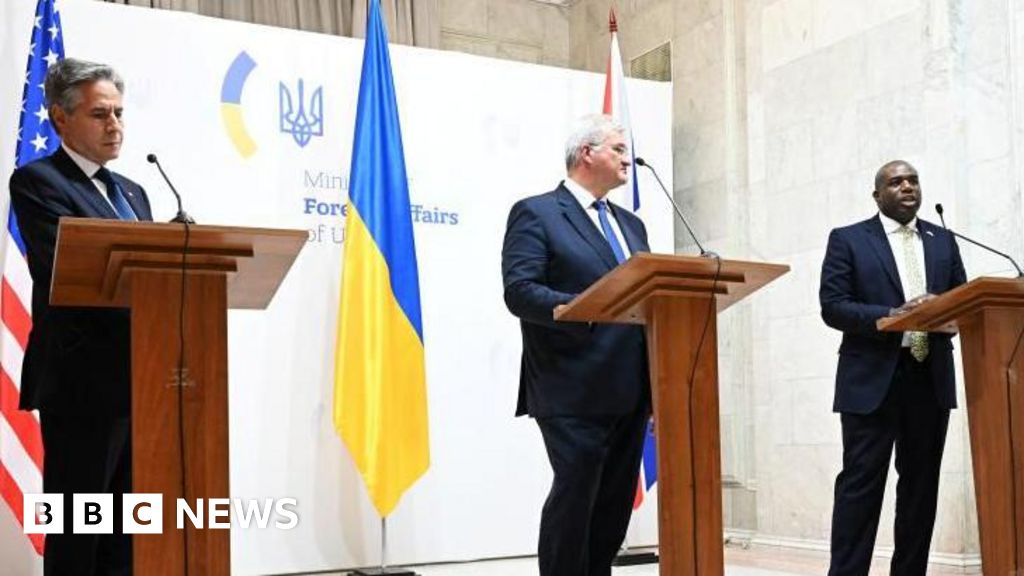The Shifting Dynamics of the Ukraine Conflict: Iranian Missiles and Western Responses
The ongoing conflict in Ukraine has reached a critical juncture, particularly with the recent delivery of Iranian missiles to Russia. This development has sparked renewed discussions among Western allies regarding the provision of long-range missiles to Ukraine, a topic that has been fraught with concerns over escalation and retaliation. UK Foreign Secretary David Lammy, during a visit to Kyiv alongside US Secretary of State Antony Blinken, emphasized the significance of this shift in the geopolitical landscape.
A Diplomatic Mission to Kyiv
Lammy’s visit to the Ukrainian capital was part of a broader diplomatic effort to bolster support for Ukraine amidst its struggle against Russian aggression. Meeting with President Volodymr Zelensky, Lammy and Blinken discussed the pressing need for allies to reconsider existing limitations on the use of Western-supplied weapons. Zelensky has been vocal in his calls for more robust military support, particularly in the form of long-range missiles that could target Russian positions.
The Debate Over Long-Range Missiles
Historically, the US and UK have refrained from allowing Ukraine to use long-range missiles against targets within Russia, primarily due to fears that such actions could escalate the conflict into a broader war. However, the recent acquisition of ballistic missiles by Russia from Iran has altered this calculus. Blinken pointed out that if anyone is escalating the situation, it is President Putin and Russia, not Ukraine or its allies. This perspective has led to a reevaluation of the restrictions on Ukraine’s military capabilities.
The Implications of Iranian Missile Support
The delivery of Iranian missiles to Russia represents a significant shift in the balance of power in the region. Lammy articulated that these missiles would enable Russian forces to penetrate deeper into Ukrainian territory, posing a greater threat to Ukrainian cities and infrastructure. He underscored the urgency of increasing support for Ukraine to counter this new danger, stating, "As we see the Russians working with their partners, we see this transfer of ballistic missiles from Iran to Russia; it is important that we do more to support Ukraine to win in their efforts."
Financial and Military Aid
In response to the evolving situation, both the UK and the US have pledged substantial financial aid to Ukraine. Lammy announced a £600 million ($780 million) package aimed at addressing humanitarian, energy, and stabilization needs, while Blinken revealed an additional $700 million in assistance, focusing on the energy sector and demining efforts. This support comes in the wake of new sanctions imposed by the US, UK, France, and Germany on Iran for its role in supplying missiles to Russia.
The Call for Bold Action
Ukrainian officials, including Foreign Minister Andrii Sybiha, have echoed the sentiment that bold action is necessary in light of the Iranian missile transfers. Sybiha emphasized the importance of lifting restrictions on long-range missile usage, arguing that such measures are crucial for Ukraine’s defense and offensive capabilities. Prime Minister Denys Shmyhal also expressed gratitude for the UK’s military support while urging for the provision of long-range equipment to strike at Russian targets.
The Risk of Escalation
Despite the mounting pressure to provide Ukraine with more advanced weaponry, concerns about escalation remain prevalent. The Kremlin has warned that any US decision to allow Ukrainian strikes on Russian territory would provoke an "appropriate" response. This delicate balance of power underscores the complexities of international military support in a conflict that has already drawn in numerous global actors.
Conclusion: A Critical Juncture
As the situation in Ukraine continues to evolve, the implications of Iranian missile support for Russia cannot be understated. The potential for increased aggression from Moscow necessitates a reevaluation of Western military aid to Ukraine. With leaders like Lammy and Blinken advocating for a more robust response, the coming weeks may prove pivotal in determining the course of the conflict. The international community faces a crucial decision: to support Ukraine more decisively or risk allowing the balance of power to shift further in favor of Russia. The stakes are high, and the world watches closely as these developments unfold.


